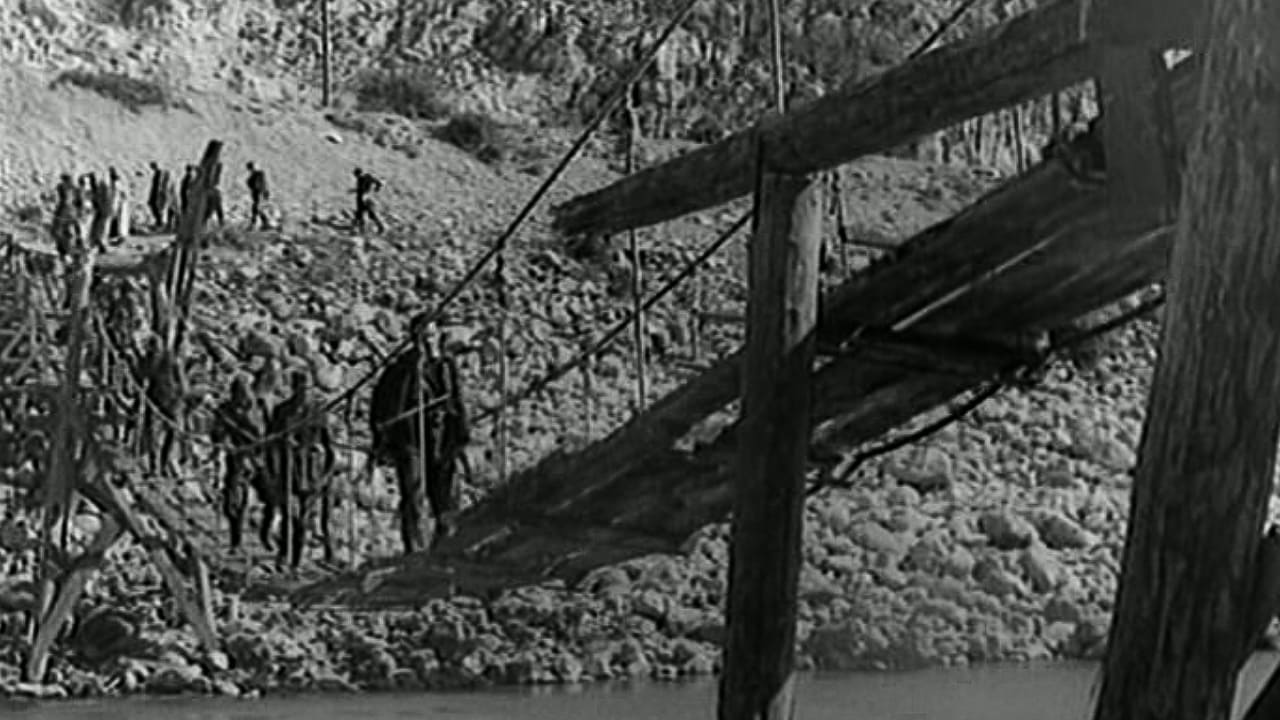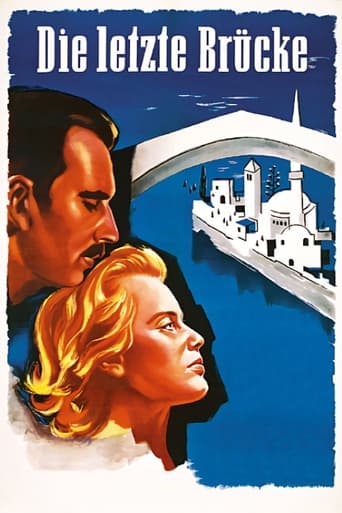Inclubabu
Plot so thin, it passes unnoticed.
Cunninghamolga
This is a gorgeous movie made by a gorgeous spirit.
Bluebell Alcock
Ok... Let's be honest. It cannot be the best movie but is quite enjoyable. The movie has the potential to develop a great plot for future movies
Tobias Burrows
It's easily one of the freshest, sharpest and most enjoyable films of this year.
Horst in Translation (filmreviews@web.de)
"Die letzte Brücke" or "The Last Bridge" is an Austrian German-language movie from 1954, the year Germany became football world champion. But that's just a side information to depict how long it's been since this was made, namely over 60 years. It is unsurprisingly still in black-and-white and was directed by Helmut Käutner, also one of the writers credited with this film. And just like so many other films from that time, it deals with the events from Nazi Germany and World War II. This one here was actually made when these events weren't a thing of the past yet for 10 years even. But sadly, this proximity in terms of time is not enough to make it a good watch. The film runs for approximately 100 minutes and stars Maria Schell as the main character. Her male co-lead Bernhard Wicki is also known to German cinephiles today. Käutner, Schell and Wicki received lots of awards recognition at the Cannes Film Festival and the German Film Awards. But I cannot share the praise. Inmy opinion, it is a very forgettable outcome and I cannot see why people loved it so much back in the day. Maybe it just hasn't aged too well. Overall, I cannot see any redeemable factors that make a difference compared to other German-language films from that time that revolved around the same subject. I do not recommend the watch.
RogerTheMovieManiac88
'Die letzte Brucke' is the second movie that I have been fortunate enough to view from the canon of German maestro Helmut Kautner. 'Des Teufels General' is a hugely admirable and evocative piece of work featuring a commanding central performance from Curd Jurgens but, in my opinion, 'Die letzte Brucke' stands above even that. It displays a special mark of inspired brilliance that confirms to me Kautner's position as one of the pre-eminent directors in the history of German cinema.Maria Schell, in one of her breakthrough leading roles, is quite unforgettable as Helga. Adding an effective touch, her shifting emotions throughout the movie are conveyed by close-ups of Schell's face. Helga is a doctor but volunteers as a nurse in war-torn 1943 Yugoslavia because of shortages. She is carefree and being romantically pursued by a young German soldier named Martin. She certainly appears a little naive about the nature of the Nazi war machine. Her untroubled existence is suddenly shattered apart when she is kidnapped by Partisans and forced to provide the rag-tag bunch with medical care.'Die letzte Brucke' is, in essence, a fish out of water tale and a movie about one woman's journey of self-discovery amidst the horrors and inevitable tangled loyalties of wartime. Helga, indeed, gradually finds herself softening in her opinion of her captors who fight as guerrillas to defend their ancestral homeland. Helga gains an ever-deeper understanding of the people, the land and their history and in this cultural aspect the movie is evocative and admirably observational. The influence of Italian neo-realism is evident throughout. The movie was filmed in and around Mostar with a Yugoslav supporting cast and there is a sparing but hauntingly effective use of traditional folk songs that certainly add to the local flavour. As the Partisan leader, Boro, extends his palm out over the landscape, we appreciate in some way the deep affinity these people have with their land and why the will to resist Fascism burns so brightly in their hearts. Kautner makes full use of the landscape and succeeds in creating a palpable undercurrent of lurking, hidden danger. The challenging terrain, the mountains, the river, and the last bridge of the title are utilised simply but compellingly to create an atmosphere fraught with fear, uncertainty and menace.'Die letzte Brucke' stands as a stirring and moving triumph and a fitting tribute to the irrepressible beauty of humanity. It is a timeless ode to a woman's selflessness and inherent integrity in the face of great personal and exterior conflict. 'Die letzte Brucke' was in a way Kautner's comeback movie after a string of financial flops ('Der Apfel ist ab', 'Konigskinder', 'Weisse Schatten', 'Kapt'n Bay-Bay') and it is a fitting movie with which to return to success. Maria Schell received special mention at Cannes for her extraordinary performance and Helmut Kautner was recognised with the German Film Award for best direction. 'Die letzte Brucke' is a movie I shall treasure in my collection. It is one of the great war movies and is in that august company thanks to skillful directorial utilisation of the surroundings and the haunting compassion of Maria Schell's Helga. * As a footnote it is interesting to consider that Bernhard Wicki, who does a good job portraying the gruff Partisan leader Boro, would go on to direct the acclaimed 1959 anti-war movie 'Die Brucke'.
cynthiahost
This movie showcased her acting ability with more controlled emotions.You hardly see her grin as she has done in American films, except then the character requires to be happy.Portraying a dedicated doctor, and volunteering as a nurse due to shortage in Yugoslavia ,who is naive about the dictatorship of her government .Everything looks perfect .She is engaged to a Nazi soldiers,Martin Berger, played by Carl Mohner.Then a bunch of people come up to her claiming they need help,The Yugoslavia good guys,Boro played by Bernahrd Wicki,Militza, played by Barbra Rutting.They need her to perform an operation for their doctor.She does n but he dos not survive.They totally needs her.She resent this at first cause she sees them as the bad guys.But sooner or later after knowing Boro and servicing the wounded ,she begins to realize that they are as human as her people.She even meets an old women woo she explained was part of the Austria Empire, gives her late son's mountain walking shoes to her .They run out of medicine and she has to go to her side to get it at a Mosque by portraying a Muslim women.Her boy friend tries to rescue her but she has to give them the medicine ,then she'll come back.The movie is anti war.It proves that war is wrong.But your corporate broadcaster may not show this film cause of it implies sympathy of the Nazis.This is what they would see in it.The corp distributors may not even distribute it on home video. Political correctness saves the greedy money. Fortunately a digital print with subtitles are available at Germanwarfils.com
andrabem
I was in the Goethe-Institut when I accidentally stumbled across this film. I went to IMDb and found good references about the film and its director and as an added attraction it featured Maria Schell in the main role. And the story seemed interesting.A German nurse, Helga (Maria Schell) is kidnapped by Yugoslavian partisans. Their doctor has died and they need another one. Helga has medical training, so she's forced to go with them. At first she goes with them unwillingly. She doesn't like them and they don't like her. As the time goes by, she begins to see them as they really are, not anymore as bandits, but as human beings that need her help. And while they are going through mountains and crossing rivers, a new understanding of the people and the land dawn on her. Sometimes they are attacked by German forces. And Helga begins to suspect that maybe things are not so simple as she once thought. She's doesn't know anymore where she belongs.This subject could have easily led to a maudlin or preachy film, but "Die Letzte Brücke" avoids these traps. "Die Letzte Brücke" manages to convey emotion through a skillful use of images and words - close-ups on Maria Schell's face, on other faces, the mountains, the rivers, the bridges. When partisan commandant Boro (Bernhard Wicki) and Helga are passing by a cemetery, he says to Helga: "Here are buried the German soldiers", and then, with a wide gesture, showing the landscape, mountains and all, he says: "and there are buried our people, my people, our land". As you see, images and words work together, the emotion conveyed by them is deep, but the film is not at all melodramatic."Die Letzte Brücke" is a refreshing change from the Hollywood diet that we are forced to swallow. The world war 2 movies made in Hollywood are usually simplistic and shallow. This film will raise many questions for those are still able to think. And Maria Schell's acting is simply superb. Highly recommended!P.S. - Some Germans of the older generation thought that Italy's armistice with the Allies was a betrayal. An Italian character that appears in the beginning of the film is shown in an unsympathetic light. A little later on, when the Italians are celebrating the armistice, a German officer comments bitterly on the "opportunism" of the Italians. Was this character expressing Helmut Käutner's opinion? I don't know. Anyway, as most people, on seeing the film, won't probably even notice the things I'm talking about, this is not so important. More food for thought!

